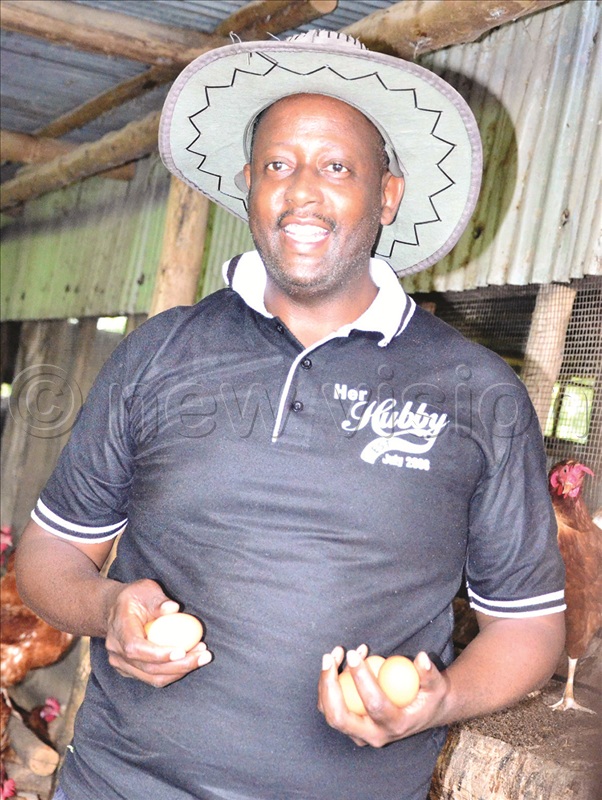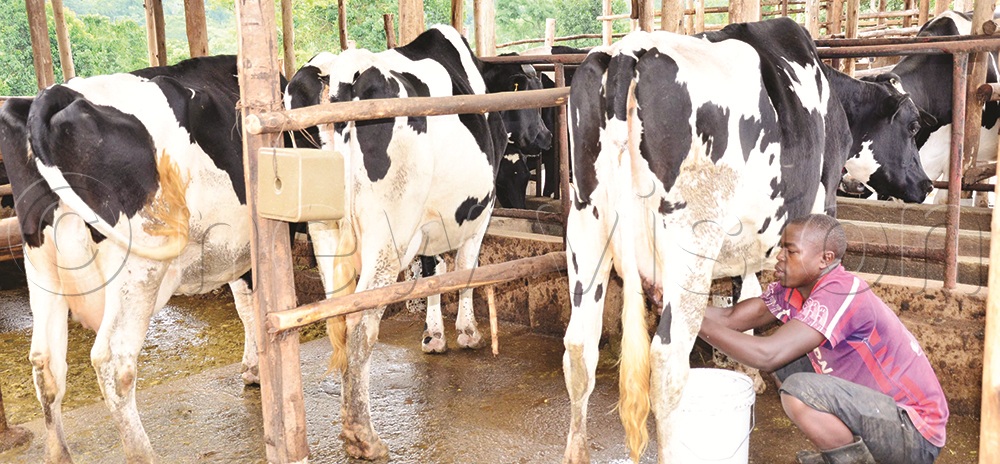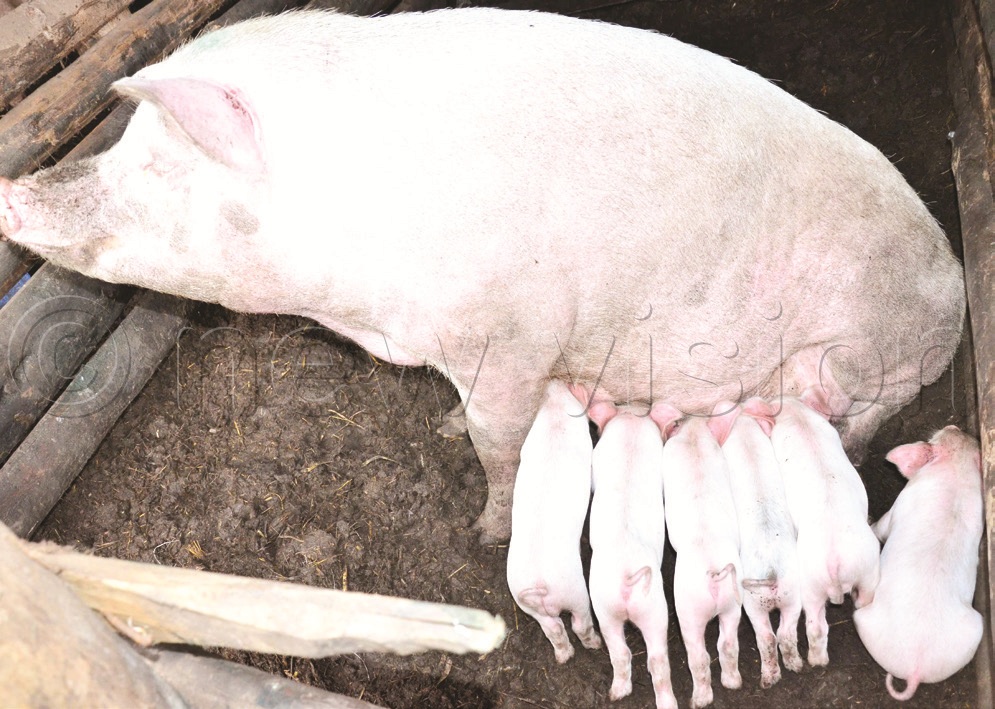The Smart Farm: How Ninsiima built a mixed agribusiness
Raised in a cattle-keeping family in Kabale district, Ninsiima always had farming in his blood. In 2013, he used his salary savings to buy three acres in Gangama village.
Ninsiima picking eggs from his poultry farm. He started with 500 broilers in 2023. (Photos by Herbert Musoke)
________________
Missed heats, wasted semen and lost calves are frustrations many dairy farmers know too well.
To combat such losses, at Smart Farm in Wakiso, Emmanuel Ninsiima has reverted to traditional ways, with a twist.
He keeps bulls on his farm, but these are carefully selected for their genetics. It’s one of several choices that have transformed his 50 acres in Gangama-Bembe, Namayumba-into a model of integrated farming.
The bull advantage
While other dairy farmers consider keeping a bull as costly, Ninsiima calls it his “magic bullet”.
Artificial insemination, he explains, is effective, but often mistimed.
“If a cow goes on heat, it should be served within 12 hours. Inseminators rarely arrive on time, so you lose both semen and a potential calf.”
To avoid such losses, Ninsiima keeps carefully selected bulls. He has two bulls on his farm, that is, Dan (a jersey) and Jonah (a friesian).
They were born of high-yielding cows, producing over 40 litres a day.
Ninsiima stresses that the bulls are managed carefully to prevent inbreeding.
Starting smart farm
Raised in a cattle-keeping family in Kabale district, Ninsiima always had farming in his blood. In 2013, he used his salary savings to buy three acres in Gangama village.

Ninsiima’s was raised in a cattle-keeping family in Kabale district
He then bought four more acres at sh4m each and gradually expanded to 50 acres, on which his farm sits.
He started with growing maize and pastures, especially elephant grass.
Ninsiima says he returned to his home village in Kabale and bought five cows, each valued at sh3m, producing 20–25 litres of milk daily.
He went on to improve the genetics through artificial insemination and also importing heifers from Kenya.
Earnings
Ninsiima has 100 cows, 20 of which are milking, with each producing about 20 litres.
This is 400 litres daily, sold at sh2,000 per litre. This translates to sh800,000 per day, from which he deducts sh300,000 for farm operations.
In-calf heifers inseminated with top semen are sold at sh10m each. Buyers also receive three weeks of caretaker training.
A day on the farm
Managing a dairy farm is a full-time job. At 4:00am, the hum of activity at Smart Farm feels more like a factory than a homestead.
Workers are already cleaning pens, boiling water and preparing feed. By 7:00am, milk cans are on their way to dairies. Cows are fed after each milking, with three main meals a day.
Breeding system
Producing high yielding cows takes planning.
“We start with the mother, ensuring she is healthy before conception,” Ninsiima explains.
He uses sexed semen to guarantee heifers and dries cows two months before calving. Here, we reduce milking frequency and milking production, Ninsiima says.

“We restrict high-protein feed and ensure the cow has a dry, clean environment to prevent mastitis and support her health until calving. In other cases, a farmer can administer dry cow therapy by infusing antibiotics into the udder,” he says.
After drying, the cows are then steamed, which is the practice of feeding extra high-energy concentrate to an in-calf cow in the final month or weeks of gestation.
This is done to prepare the cow for calving and lactation by building up energy reserves, repairing her body and stimulating udder development.
The goal is to improve milk production after calving, increase fertility and prevent metabolic disorders.
Calves are housed in a special shelter for three days, then moved to pens and gradually weaned by five months.
Regarding mating, Ninsiima says a heifer goes on heat by 13 months, but they are not served until they are 15 months old.
First-time heifers are bred with jerseys to ease calving, then later with larger breeds like friesians.
Pasture and feeding
Over 20 acres are dedicated to fodder, which includes pakchong napier, chloris gayana and maize.
Ninsiima also buys sweet potato vines and maize stovers from neighbours to make silage.
“We mix pastures to ensure balanced nutrition for both yield and quality,” he says.
Cows are also fed dairy meal and brewer’s waste. It is a nutritious and affordable feed for dairy cows, providing valuable protein, fibre, energy and minerals such as calcium and phosphorus.
These are crucial for milk production, overall health and digestion system for the cow.
Water and hygiene
Through government’s Water for Production programme, Ninsiima received a solar pump and three 10,000 litre tanks in 2023 from the Wakiso district production office.
He uses the system to supply the whole farm with clean and safe water that supports both feeding and hygiene. Houses are scrubbed daily with liquid soap, wood ash and aloe vera.
“Wood ash kills germs and leaves a smoky aroma that encourages animals to eat and drink,” Ninsiima explains.
Using ash and aloe vera also reduces soap consumption from 100 litres to 40 litres a week.
Poultry
Ninsiima ventured into poultry farming in 2023 with 500 broilers. He kept improving and last year, he changed to layers. During this year’s Easter season, Ninsiima sold 800 birds as off-layers.
Today, he has 2,400 birds at different ages, with 1,600 laying eggs. Ninsiima collects over 45 trays of eggs a day, selling each at sh11, 000.
“I stock 800 chicks every six months, ensuring an all-year supply,” he says.
The farm also grows maize and has a mill to process it into livestock seed. The feed is milled on site from maize grown on the farm or bought cheaply and stored in silos.
“This helps to minimise the feed cost during times when the prices rise,” Ninsiima adds.
Piggery
Ninsiima rears Large White breed pigs and has over 20 of them. He sells about five pigs a month between sh200,000 for a month old piglet and sh800,000 for a mature pig, on average.

Ninsiima has over 20 pigs at his farm
“I use Indigenous Microorganisms (IMO), where we dig a hole about two to three feet deep and use sawdust, which we mix with charcoal dust. These organisms feed on dung and urine, thus maintaining the hygiene in the pig houses and also preventing a foul smell,” he explains.
Market and value addition
To control prices and reduce theft, Ninsiima sells only through six outlets in nearby trading centres.
In addition to selling products, two of the outlets have yoghurt processing machines, which has increased farm incomes as from one litre of milk, which cost sh2,000, they earn sh10,000 through value addition. Waste management Cow pens are cleaned daily, generating large amounts of waste.
Combined with poultry and piggery droppings, this waste is collected at a central point, left to decompose, and later used as organic fertiliser in pastures, banana plantations and maize gardens.
Workforce
The farm employs 40 workers across its enterprises, each earning an average of sh150,000 per month, plus food, housing and medical support. The manager earns sh600,000.
According to Ninsiima, staff motivation is key.
“To get the best, we must provide incentives and a conducive environment.”
Plans are underway to introduce health insurance to make employees feel valued.
Community engagement The farm has become a learning centre for the surrounding community, where we train at least 50 farmers a month.
Neighbours frequently visit for free training in dairy management, and some have started keeping cows.
“My immediate neighbour began with a local cow, but plans to improve the breed through artificial insemination,” Ninsiima notes.
Half of the farm’s employees are from the community, creating jobs and income.
The farm also buys potato vines and maize stover from local farmers, turning what would be waste into a source of revenue.
Record keeping
Every activity is documented — from visitors and sales to feed, machinery and salaries. Each calf is named, tagged, and given a file recording its birth, breed, treatments and growth history.
Family and security
Smart Farm is a family business. Ninsiima’s wife, Miriam, supervises operations when he is away, manages yoghurt production and oversees farm accounts.
Their children are also fully involved during the holidays, especially with feeding the birds and animals, as well as picking eggs.
“We want to ensure that this farm stays for generations, which is why we are interesting our children to learn and get practically involved to appreciate that farming is actually a profitable venture if managed as a business,” explains Miriam.
Security is tight, with a perimeter wall and chain link fence.
“This protects animals from stray livestock that spread ticks and from thieves. Also, at every house entrance, there are footbaths in which whoever is authorised to enter must first step in,” says farm manager Henry Bumari.